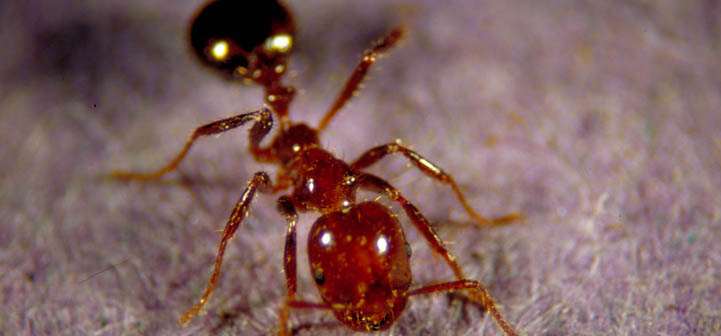Home > How to Kill Fire Ants > Home Remedies
Many fire ant home remedies have been proposed and used. However, many fire ant products on the market are as safe as or safer than the home remedies. Often, a home remedy does not kill the entire colony. To completely eliminate a colony, it is necessary to kill the egg-laying queen(s).
For safe, effective ways to control fire ants in home grounds, see Fire Ant Control: The Two-Step Method and Other Approaches.
One of the most commonly suggested home remedies, instant grits, has been scientifically proven to have no effect. Baking soda, vinegar, club soda, molasses, plaster of Paris, and aspartame are also NOT effective home remedies.
Home remedies are often desired because they are perceived as being safe, but this is not always true. Gasoline or diesel oil, chlorine bleach, ammonia, drain cleaners, and acids are dangerous to pets, children, and livestock, and the runoff from these products can contaminate water. Furthermore, it is illegal to use these substances to control pests.
One old home remedy, pouring hot water on the mound, is about 60 percent effective, but it is dangerous to the applicator and will kill the surrounding vegetation. Additionally, about three gallons of water must be used in an attempt to reach the reproductive areas of the mound. Soapy water is also about 60 to 70 percent effective. Hot or soapy water may kill only a portion of the colony or cause it to move. Colony relocation is also likely to occur when someone tries to dig a colony out of an area. This practice must be done carefully to avoid being stung.
One method currently being evaluated and showing some promise as an effective home remedy is an ant mound drench using a mixture of dishwashing liquid and citrus oil.
View a report on this topic on pages 4-8 of the Texas A&M AgriLife Extension Service’s 2008 Urban IPM Handbook, To recommend this practice, however, Extension Service agencies must have approval from the Environmental Protection Agency (EPA).
Related Content
- Do grits kill imported fire ants?
- Can I burn imported fire ants with gasoline?
- Fire Ant Project Fact Sheet, Organic and Other Methods of Fire Ant Control
- Fire Ant Control: The Two-Step Method and Other Approaches
References
- Evaluation of Molasses as a Mound Treatment for Red Imported Fire Ant Control, Texas AgriLife Extension Service 2006 Urban IPM Summary Report
- Evaluation of Aspartame as a Mound Treatment for Red Imported Fire Ant Management
- Evaluation of watered in aspartame as a mound treatment for red imported fire ant management, Texas AgriLife Extension Service 2008 Urban IPM Handbook
- Evaluation Of Red Imported Fire Ant Mound Treatments: Arinix®, Gardstar®, Qrd-400 And A Home Remedy Of Citrus Oil Plus Dishwashing Liquid, Texas Extension Service 2007 Urban IPM Handbook
- Evaluation of Soaps and Oils, Murphy’s Oil Soap, QRD400, Canadian Petroleum Products Formulations Lawn 1 and 2, Texas AgriLife Extension Service 2007 Urban IPM Handbook
- Comparison of individual mound treatments for red imported fire ants, Solenopsis invicta Buren, (Hymenoptera: Formicidae), TexasAgriLife Extension Service 2008 Urban IPM Handbook
